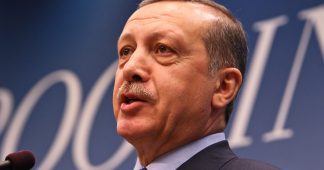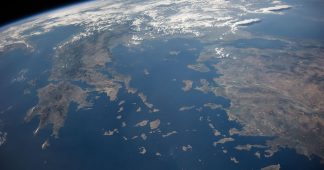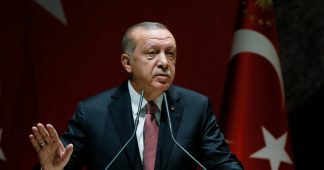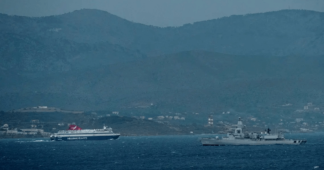By John Solomou
Nicosia [Cyprus], June 13 (ANI): Turkish President Recep Tayyip Erdogan, who has led Turkey for the past 20 years, announced during a speech in Izmir on June 9 that he will seek re-election in next year’s elections.
As Turkey is facing a serious economic crisis, Erdogan, seeing his popularity falling rapidly in repeated opinion polls, is trying to win votes by escalating his rhetoric against Greece and by mobilizing the big network of imams to persuade Turkish expatriates to vote for him.
Speaking after watching military exercises in Izmir, on the same day he confirmed that he will run in the June 2023 elections, Erdogan increased tensions with Turkey’s neighbour Greece, warning Athens to stop arming Aegean islands that do not have a military status.
In Turkey’s view, the Aegean islands were given to Greece under the 1923 Lausanne Treaty and the 1947 Paris Treaty on the condition that they would not be armed. Ankara accuses Greece of having military units and weapons systems mainly on the Dodecanese islands in East Aegean.
“I warn Greece to avoid dreams, acts and statements that will result in regret. Come to your senses, ” Erdogan said and added that Turkey will not renounce its rights in the Aegean and will not back down from using rights that are established by international agreements when it comes to arming islands.”
Erdogan’s coalition partner and leader of the ultra-nationalist MHP Party Devlet Bahceli also accused Greece of escalating tensions and said that the Greeks are playing with fire.
“The question of the Dodecanese islands, which is the continuation of Anatolia, is a wound that has not yet closed,” declared Bahceli and ominously added: “The stolen items must be returned to the owner, whether voluntarily or by force.”
Furthermore, Bahceli claimed that the nine military bases that the US has set up in Greece are a threat to Turkey’s national identity. “Greece’s request for F-15 and F-16 aircraft from the US is not an invitation to peace, but to polarization, ” he said.
The response of the Greek Government is that Turkey deliberately misinterprets the treaties regarding armed forces on these Greek islands and insists that it has legal grounds to defend itself in the face of Ankara’s hostile actions.
Ankara has recently launched a barrage of violations of Greek airspace. Greek aircraft always identify and intercept the Turkish fighter jets.
It is noted that in the summer of 2020, the ongoing dispute between Athens and Ankara over significant gas deposits in the eastern Mediterranean almost led to a military conflict after Turkish research ships had been crossing Greek waters for many days.
Erdogan in the past few weeks has kept lashing out at Greece, trying to “put it in its place”, threatening it with severe consequences. He does this because, on the one hand, he sees Athens as a soft and easy target, and, on the other, he increases tensions with NATO ally Greece as a leverage on the United States regarding his plans to invade northern Syria and to get recognition of his demands on the energy resources of Eastern Mediterranean.
The Turkish President and his ultra-nationalist ally Bahceli have seen their popularity falling in opinion polls and fear a voter backlash, as Turkey’s inflation keeps soaring at 73 per cent, while energy and food prices are reaching unprecedented heights, unemployment keeps rising and the value of the Turkish Lira is declining rapidly.
That is why on March 31, the Turkish Parliament, where Erdogan’s AKP and Bahceli MHP currently control the majority, voted to lower the election threshold from 10 to 7 per cent, because polls showed that MHP will remain under the 10 required per cent threshold in a possible election.
Erdogan is also greatly worried about the declining popularity of his own party AKP, because the latest opinion polls show that the support it enjoys has fallen to 27.7 per cent, from the 42.6 per cent it scored in the 2018 elections. So, Erdogan needs every single vote he can get to narrow the gap with the opposition parties.
As in the 2018 presidential election, Erdogan won almost 60 per cent of the ex-pat votes, he is quite aware that the votes of the Turkish diaspora have become extremely important and to this end uses government-appointed imams to communicate messages to voters in mosques.
To achieve this, the President of Turkey relies on the Diyanet (the Religious Affairs Directorate) which is run by Ali Erbas, somebody he personally chose, to propagate political Islam and AKP’s positions and ideology.
In less than a decade, Diyanet’s budget quadrupled to $ 1 billion, and it employs over 120,000 people, making it one of Turkey’s largest state institutions – bigger than the Ministry of Interior. Diyanet has become a giant government bureaucracy for the promotion of Sunni Islam.
Diyanet offers Qur’an courses, especially summer courses for children, issues fatwas on demand, but also comments on political affairs and has extensive financial interests. Some people call it the “Diyanet holding”.
Earlier this month, most probably acting on Erdogan’s orders, Ali Erbas organized in Ankara a big meeting of Diyanet’s most important cadres in Europe as well as attaches and consuls and reportedly asked them to canvass the diaspora to vote for Erdogan.
Later participants were taken to the presidential palace for a private audience with Erdogan. What was said at the meeting remains unknown, as the Presidential Palace did not issue any press release on the meeting.
Investigative journalist Abdullah Bozkurt, who is the Chairman of the Stockholm Centre for Freedom, in a relevant article wrote: “The Diyanet has been radically transformed in the last decade under Erdogan’s rule and has turned into an instrument for projecting the ruling party’s polarizing and divisive political Islamist ideology in both Turkey and abroad. Those who resisted the politicization of the religious body were purged en masse in recent years, replaced with partisans and loyalists whose mandate was to do the government’s bidding under religious camouflage.” (ANI)
Also read
Athens shocked after Erdogan threatens in Greek
We remind our readers that publication of articles on our site does not mean that we agree with what is written. Our policy is to publish anything which we consider of interest, so as to assist our readers in forming their opinions. Sometimes we even publish articles with which we totally disagree, since we believe it is important for our readers to be informed on as wide a spectrum of views as possible.











